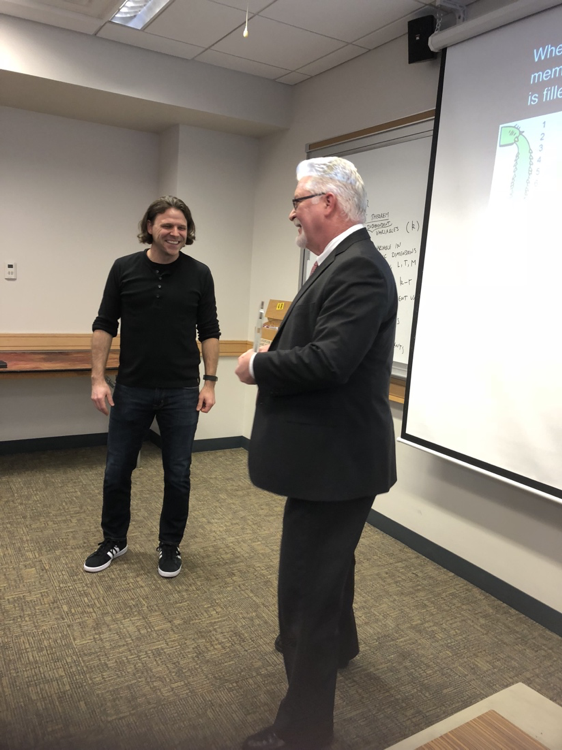“It’s an incredible honor for me, I’m really lucky. It shows me that students really want the material that they’re learning to be relevant to current and important topics in biology and medicine,” said James Monaghan, Assistant Professor of Biology.
Earlier this month, five minutes into his Stem Cells and Regeneration class, Monaghan’s class was interrupted as Provost James Bean and Senior Vice Provost Debra Franko entered the classroom to announce the exciting award. With a photo of a regenerating cockroach arm in the background, Bean presented Monaghan with this year’s University Excellence in Teaching Award.
“I had no idea it was coming,” said Monaghan. “It’s the coolest thing that they actually came into class!”
After receiving his BA in Biology from DePauw University in Greencastle, Indiana, and his PhD in Biology from the University of Kentucky in Lexington, Kentucky, Monaghan completed postdoctoral research at the McKnight Brain Institute at the University of Florida. Then, in the fall of 2012, Monaghan joined the Northeastern faculty in the Department of Biology.
In his lab, he studies how some animals can regenerate tissues using the axolotl salamanders, which can regenerate parts of their tail, arms, and heart. The lab’s research focuses on how this model organism can do this so well while humans and other species are so limited in their regenerative capabilities.
Right now, the Monaghan Lab is working on five different projects including one working on translating information on axolotl retina regeneration to retinal stem cell transplants in mammals. “The future is to really understand what genes are utilized in salamanders to allow them to regenerate – what makes their DNA so accessible to the programs that allow you to regrow tissues, that’s still unknown,” said Monaghan.
The Monaghan Lab incorporates about six undergraduate students per semester, as well as co-op students. Since 2012, over 40 students have been a part of the exciting research being done.
“We’re really lucky that the undergraduates here can really contribute to the research. It’s been really helpful to build upon their experiences – coming back from co-op where they’re screening hundreds of cell lines at a time, working with a variety of animals, and they can really jump right in and do meaningful research and contribute to papers published in top journals,” Monaghan said.
He loves the training aspect of his job and enjoys keeping in touch with his many students through graduate and medical school and looks forward to seeing his students get their own positions in research or as faculty members.
Through his time at Northeastern, Monaghan has developed two different courses – Stem Cells and Regeneration, and Developmental Neurobiology. The stem cell field changes every semester in the course, and Monaghan said that makes the course a lot of fun to teach.
“We try to take a really modern approach to the class, reading research manuscripts and breaking those down into the historical background of the material and new methods being used and how this changes our understanding of the field,” he said.
Monaghan also really enjoys teaching Developmental Neurobiology, where students learn about how the nervous system is patterned, what codes for each part of the body, and how every nerve can find every muscle in the body to work with.
“Students make it so easy, always asking questions and finding new research to incorporate into class,” he said.

